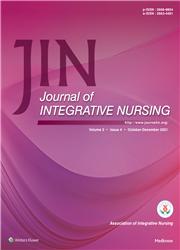Effect of prayer on the self-care agency and hope in hemodialysis patients
Q4 Nursing
引用次数: 0
Abstract
Background: The level of self-care of hemodialysis patients is important in controlling the disease process and symptoms. Nursing care has an important place in the process of resolving existing or developing problems of patients receiving hemodialysis treatment and in adapting to treatment. Prayer is not only a resource that encourages religious/spiritual coping, it is also a spirituality that strengthens hope. Objective: The objective of this study is to determine whether prayer has an effect on self-care agency and hope in hemodialysis patients. Materials and Methods: This is a descriptive and correlational study which was conducted with 180 patients in a private and a public dialysis center. The data of 173 hemodialysis patients who met the inclusion criteria were collected using personal information form, Herth Hope Scale, Self-care Agency Scale, and Prayer Attitude Scale. Results: A positive, moderate, and statistically significant correlation was found between the Prayer Attitude Scale and total score (r = 0.144, P = 0.048) and sub-scale future (r = 0.350, P = 0.000) of Herth Hope Scale. And there was positive correlation between the Prayer Attitude Scale and the total score of Self-care Agency Scale (r = 0.599, P = 0.000) and its five sub-dimensions drug use (r = 0.566, P = 0.000), diet (r = 0.619, P = 0.000), self-monitoring (r = 0.522, P = 0.000), hygienic care (r = 0.576, P = 0.000) and mental status (r = 0.328, P = 0.000). Conclusions: The study found that prayer had a positive effect on self-care agency and hope in hemodialysis patients.祈祷对血液透析患者自我照顾能力及希望的影响
背景:血液透析患者的自我护理水平对控制病情进程和症状具有重要意义。护理在解决血液透析治疗患者存在或发展中的问题,适应治疗过程中占有重要地位。祈祷不仅是一种鼓励宗教/精神应对的资源,也是一种加强希望的精神。目的:探讨祈祷对血液透析患者自我照顾能力和希望的影响。材料和方法:这是一项描述性和相关性研究,在一家私立和一家公立透析中心对180名患者进行了研究。采用个人信息表、赫斯希望量表、自我照顾代理量表和祈祷态度量表对173例符合纳入标准的血液透析患者进行数据收集。结果:祈祷态度量表与赫斯希望量表总分(r = 0.144, P = 0.048)、分量表未来(r = 0.350, P = 0.000)呈正相关、中度相关、有统计学意义。祈祷态度量表与自我照顾代理量表总分(r = 0.599, P = 0.000)及其药物使用(r = 0.566, P = 0.000)、饮食(r = 0.619, P = 0.000)、自我监控(r = 0.522, P = 0.000)、卫生保健(r = 0.576, P = 0.000)、精神状态(r = 0.328, P = 0.000)呈显著正相关。结论:本研究发现祷告对血液透析患者的自我照顾能力和希望有正向影响。
本文章由计算机程序翻译,如有差异,请以英文原文为准。
求助全文
约1分钟内获得全文
求助全文
来源期刊

Journal of Integrative Nursing
Nursing-General Nursing
CiteScore
0.40
自引率
0.00%
发文量
3
审稿时长
17 weeks
 求助内容:
求助内容: 应助结果提醒方式:
应助结果提醒方式:


